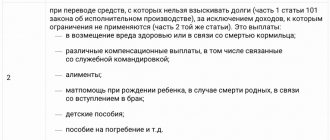Even after going to court to collect alimony and making a positive decision, the father does not always begin to regularly pay financial assistance for a minor child with whom he does not live. If for a long time the payer does not receive the alimony payments established by the writ of execution, then the mother has no choice but to contact the bailiff service to hold the alimony payer accountable and force her to repay the debt. However, first you need to write an application for the calculation of alimony debt to the bailiffs.
In what cases is it possible to apply for debt settlement?
To calculate the debt, it is necessary to file a claim, but for this certain conditions must be met (Federal Law No. 229, Article 50):
- Firstly, the claimant must have in his hands an official document confirming the assignment of alimony - a writ of execution or a notarial agreement.
- Secondly, it will not be possible to collect the debt in more than 36 months.
- Thirdly, only the legal representative of the child or the child himself upon reaching 18 years of age can submit an application.
Typically, penalties are applied to the defaulter when alimony payments are not received by the recipient for more than 3 months. You must understand that if you do not have a court decision or a notarial agreement, then it is impossible to collect. Therefore, it is so important not only to verbally agree with the father on financial assistance to the child, but also to give this fact legal force.
Further actions
If the applicant managed to achieve a positive result and prove his position to the court, then he needs to receive a court decision that has entered into legal force. The writ of execution can be the decision itself, but if the relevant information is not included in it, then you must additionally obtain a writ of execution.
After receiving the court decision and enforcement documents, they must be provided to the bailiff service to open a new proceeding.
For what period can a debt be collected?
If previously enforcement proceedings were opened to collect alimony based on a court decision, then if a debt arises, you can contact the FSSP in order to pay it off, by applying appropriate measures to the alimony payer. According to Article 107 of the Family Code, the statute of limitations for collecting alimony, if you have a writ of execution or a notarial agreement in your hands, is 3 years. That is, if the debt accumulates over a long period of time, you can demand reimbursement of debt for no more than the last 36 months.
Purpose
The collection of alimony is carried out by court order or by a court decision made in the procedure of claim proceedings. The court establishes the amount of deductions and their frequency in a decision or order or issues a separate writ of execution. After this, the decision is executed, which is controlled by the bailiff service.
If alimony payments are not paid on time, payment arrears arise. Some payers deliberately try to stretch out the alimony payment period and hide their real earnings.
In the event of arrears in payments, the collector will need to seek its repayment through the bailiff service.
Where to contact
First, you need to submit an application for calculation of alimony debt to the FSSP, to the bailiff who is conducting your enforcement proceedings for the collection of alimony. To do this, you just need to make an appointment with him at the specified phone number on the official website or submit documents along with an application to the service office. Typically, the processing time for your application is no more than 3 days.
Try to take with you a copy of the document where the bailiff will mark that your appeal for debt settlement has been accepted for consideration.
As a result, you receive a certificate with the amount and duration of alimony debt. With this certificate, you are sent to the judicial authority - the magistrate's court, where further measures will be prescribed to collect the debt. Here, the judge first of all pays attention to the decision made by the bailiff, so before going to court, be sure to first obtain a certificate calculating the alimony debt.
Process order
After the debt has been calculated at the request of the payee and a statement of claim has been drawn up, you need to file it with the magistrate’s court at the debtor’s place of residence. The claim must be considered by a judge within five days, after which a court hearing is scheduled for a certain date and time.
It is important to take into account that before going to court, the applicant must pay a state fee, which can be asked to be recovered from the defendant in the lawsuit. The application is considered according to the rules of claim proceedings, the parties to the dispute are called to the hearing, who must justify their position with arguments and confirm the facts with evidence.
The plaintiff should take into account that the legislation provides for the following cases when the payer may be released from debt:
- the debtor is located in the area of a natural or man-made disaster;
- the defendant is in a zone of combat, terrorist operations or is being held hostage;
- the payer has experienced force majeure circumstances that prevent the payment of deductions.
In addition, the debt is not calculated in the case when it was formed through the fault of other citizens. Such persons may be, for example, employees of the debtor’s employer who did not transfer payments on time, bailiffs who did not initiate enforcement proceedings, or employees of banking institutions who made a mistake with the transfer of funds.
The defendant should take into account that not all circumstances provide an opportunity for exemption from alimony payments. In particular, the law does not include the following situations as such circumstances:
- onset of disability;
- dismissal of the payer from work;
- permanent or temporary loss of ability to work;
- failure to repay transfer fees or payments to institutions, as a result of which the accrued amount was insufficient;
- reaching retirement age;
- bankruptcy of the payer;
- the occurrence of other obligations of a material nature, for example, in connection with the issuance of new loans, compensation for harm to citizens, or payment of fines for committing various offenses.
In the listed cases, the correct action of the alimony payer would be to submit an application to reduce their amount or frequency of accruals, but not to stop payments, which led to the formation of debt.
Is alimony paid from an individual entrepreneur? The answer is presented in the article “How to collect alimony from an individual entrepreneur.” You can find out whether the child’s father can apply for alimony for his maintenance here.
How to draw up an application for calculating arrears of alimony
To prevent your application from being rejected, it must be written correctly. At the information stand in court or the FSSP there is a sample application that will help you understand the correctness of the preparation and writing of the application. So, the document should look like this:
- in the header we write the name of the organ, its address;
- Below we indicate the personal information of the applicant - full name, residential address, telephone number and information about the alimony payer;
- in the middle we write the name of the document “Application for collection of alimony debt”;
- with red, indicate all the necessary information that directly relates to alimony payments - the number of enforcement proceedings, the start date of alimony collection, the date of debt formation, amount, frequency and order;
- write when the last alimony payment was made and for what period the debt needs to be calculated;
- indicate the essence of the request and refer to the legislative acts governing this provision;
- List all attached documents in the form of a list.
- date and signature.
The calculation of alimony debt is carried out on the basis of Article 113 of the Family Code and Federal Law No. 229, Article 102. They serve as the basis for filing an application with the FSSP.
The statement of claim for the purpose of calculating the debt for alimony payments must have a strict form of writing and a clear structure. The procedure for writing an application is set out in more detail in Articles 131-132 of the Civil Procedure Code. This will avoid unnecessary errors and problems. Please remember that the submitted data must not contain errors or false information.
General information about alimony
If funds are forcibly withheld, bailiffs are responsible for executing the collection. Their activities are regulated by 229-FZ of 2007.
Cash for minors or disabled relatives can be paid in the following order:
- voluntarily;
- forcibly.
The parties (the alimony payer and the recipient) can independently determine the amount and procedure for paying financial support. The law provides for the possibility of formalizing voluntary payments (notarial agreement) or an oral agreement.
The notarial agreement is governed by Sec. 16 IC RF. Former spouses agree on the amount, frequency, the need for reporting for funds spent and other conditions. They draw up a written agreement and have it certified by a notary.
Important! The established amount cannot be less than the amount of payment required by law. For example, for 2 children, at least 33% of the father’s income.
The document has the force of a writ of execution and is subject to transfer to the FSSP if one of the parties refuses to comply with it.
An oral agreement is not directly provided for by law; however, there are no rules of law prohibiting the parties from independently resolving the issue of payments, without additional documentation.
Compulsory collection is carried out on the basis of a court decision. Depending on the specific situation, a writ of execution may be issued on the basis of a court order or court decision. The order is made by a magistrate when considering an application containing demands solely for alimony. A court decision is issued by a city/district court when considering a claim for alimony and a dispute between parents (child’s place of residence, divorce, division of property).
If the defendant refuses to voluntarily comply with the court decision, the writ of execution is submitted to the Federal Bailiff Service. After which the funds are forcibly withheld.
Required documents
In addition to writing your application correctly, you are also required to attach a package of necessary documents on the basis of which your application will be considered.
- applicant's passport;
- income certificate of the parent living with the child;
- birth certificate of a minor child;
- certificate of cohabitation of the applicant with a dependent for whom alimony is paid;
- divorce certificate (if there is a fact of marriage registration);
- certificate from the bailiff;
- writ of execution for the collection of alimony or alimony notarial agreement;
- documents that will act as evidence of non-payment of alimony, for example, a bank account statement.
You will also be required to pay the state fee and attach a receipt to all of the above documents. The amount of the state duty is determined by Article 333.19, paragraph 1 of the Tax Code.
It is advisable to attach not only copies of documents to the application, but also take the originals with you, since some papers, for example, certificates from the bank or from the place of work about the amount of wages, will be required with a stamp. If you have other documents that are not listed in this list, but are directly related to this case, then they must also be supported by the statement of claim.
Debt formation
If the payer begins to delay payments, this may not always be his fault. Delays are often possible due to the negligence of an accountant or bank employee. Then compensation can be obtained from an official or an organization.
In addition, this may be a one-time delay. But if there is the intent of the payer, then it is possible to recover not only the debt itself, but also the penalty. You can receive compensation in court if:
- the parties entered into an agreement;
- alimony is paid on the basis of a writ of execution or a court order;
- the debt arose several months ago;
- bailiffs are inactive.
You cannot receive debt and penalties in the case when:
- financial assistance was provided by the parent voluntarily and without completing the relevant documents;
- the recipient did not hand over the writ of execution to the bailiffs or the employer;
- the payer made a delay for a valid reason.
At the same time, a valid reason does not exempt the payer from repaying the debt and penalties, but in this case they can only be recovered for the last 3 years. These reasons include:
- disability;
- serious illness;
- loss of job (due to the fault of the employer);
- other financial difficulties;
- emergence of other dependents.
Even disability or payment of alimony for other children does not relieve the payer from his obligation to support the child.
Terms of consideration
As for obtaining a certificate of alimony debt, its amount and duration, which is prepared by the bailiff, this may take no more than 7-10 days from the date of writing the application requesting its provision. After this, all the necessary documents, along with the statement of claim and the order from the bailiff, are transferred to the judge. According to the law, it takes no more than 30 days to consider the case and make a decision, but as practice shows, this happens much faster. They cannot refuse your application; this is prohibited by Russian law.
General information
Child support is paid on the basis of Chapter 17 of the RF IC. The payment period is until the child reaches adulthood. If he has a disability and is unable to work, then alimony is paid for life. After 18 years of age, financial assistance is provided if the child is studying. In this case, the payment of alimony is extended to 23 years.
Making a decision
After the statement of claim, together with the decision on the calculation of the debt, is transferred to the magistrate's court, the court decision is made in a simplified form, and it usually takes 5 days, but sometimes the deadlines can be delayed. Court hearings do not take place, since there are no disputes and the judge is only required to make a decision on the punishment for the defaulter so that this affects the repayment of the debt. As a result, you can get:
- extract from the court decision;
- performance list;
- a copy of the court decision.
After receiving the decision, you are again sent to the bailiff, and based on the issued order, he begins collection measures. The bailiff first notifies the payer about the initiation of enforcement proceedings, about the amount of the debt, and in the absence of complaints, the document takes on legal force. If the defendant does not agree, he can file a counterclaim.
How to appeal a decision in court?
An appeal against a decision is carried out within the framework of administrative proceedings.
The claim is sent to the district court at the location of the FSSP. What it looks like:
- The plaintiff files a claim drawn up taking into account the requirements of Art. 124 CAS RF. It must contain the name of the defendant, information about the contested decision, claims to invalidate the document and to order a new recalculation.
- Within 3 days, the judge makes a decision to accept the statement of claim for proceedings. Copies are sent to all parties.
- The case is considered within 2 months. This period includes preparation for proceedings.
- At the end of the trial, a decision is made in the deliberation room.
An extract from the decision is transmitted to the parties. Representatives of the FSSP are usually present at the meetings.
What to do after receiving a court decision?
Having received a court decision, the claimant or debtor submits it to the FSSP for execution. The deadline for fulfilling the requirements is indicated in the document.
With further inaction, it is allowed to re-file an administrative claim, but this time due to failure to comply with the requirements of the court decision. The defendant here is not the representative of the FSSP, but the bailiff himself.
Based on the results, he may be brought to administrative responsibility, and the head of the FSSP may be subject to disciplinary action: he may be reprimanded, reprimanded, or fired if such offenses have been observed by the bailiff more than once.
In some cases, criminal liability arises under Art. 315 of the Criminal Code of the Russian Federation, if damage was caused to the plaintiff by inaction. What penalties are possible:
- fine up to 200,000 rubles. or in the amount of salary up to 18 months;
- disqualification for 5 years;
- forced labor for up to 2 years;
- compulsory work up to 480 hours;
- imprisonment for up to 2 years;
- arrest for up to six months.
The verdict on criminal liability is passed by the district court - the lawsuit should also be filed there.
Debt collection by bailiffs
The alimony debt does not pass without a trace for the payer. After the claimant has gone to court and received a decision on further punitive measures against the debtor, the bailiff begins to implement them. To induce the debtor to fulfill alimony obligations, the bailiff may resort to the following collection measures, which are recorded in the Codes of the Russian Federation:
- imposition of a fine of up to 25,000 rubles;
- accrual of a penalty of 0.5% for each day of delay;
- deprivation of driver's license;
- ban on leaving the country;
- blocking of bank accounts;
- possible arrest for up to 15 days;
- assignment of forced labor for up to 150 hours
- a request for the availability of property of the alimony payer and seizure of the discovered property for the purpose of further sale to pay off the debt;
- imprisonment for up to 1 year
Thus, it will not be possible to avoid punishment for long-term failure to fulfill alimony obligations. The main responsibility for penalties lies with the bailiff, therefore, if he behaves negligently, you can write a complaint about the inaction of an FSSP employee. If you have accumulated arrears for several months on alimony, you should not wait for the payer to come to his senses, immediately contact the bailiff with a request to calculate the total amount of the debt and submit documents with an application to the court.
Arbitrage practice
In cases of challenging bailiff decisions, judicial practice is ambiguous. Most often, claims are not satisfied for the following reasons:
- failure by debtors to provide information on income during the period of debt formation (accruals will be made based on average earnings);
- lack of grounds for appeal;
- absence of valid reasons for missing the deadline for filing a complaint.
Each case is considered individually in court.
Appealing a decision of officials
As stated above, violations by an FSSP employee or disagreement with his decision can be appealed to higher management, the prosecutor's office or in court . This applies to cases when the payment made towards alimony is not taken into account, or its amount is set incorrectly, restrictions are unreasonably introduced or property is seized.
Finally, the inaction of bailiffs, which happens often, can also be appealed. For example, upon receiving an application, an FSSP employee is obliged to make a decision and immediately forward it to the interested parties. If there is no document, the payer or recipient of alimony has the right to file a complaint. The same applies to the bailiff’s decision, which does not suit one of the parties.
Legal consequences of late payment of alimony
If the debtor does not transfer money on time or in full for the maintenance of his children, coercive measures and restrictions may be applied to him, provided for by Russian law. Thus, he may be prohibited from traveling abroad or given criminal penalties. In addition, the bailiff has the right to seize property belonging to the debtor, including funds in bank deposits and accounts.
For the claimant, the need to obtain such a document is often justified by another reason. So, if a person who has the right to alimony is entitled to any social payments (benefits, compensation) from the state, it is important to prove that he does not receive payments for children due to the debt of the payer.
Otherwise, the citizen will be denied government support measures due to the assumption that his income (together with the alimony due) exceeds the minimum rates entitling him to receive money from the budget.









